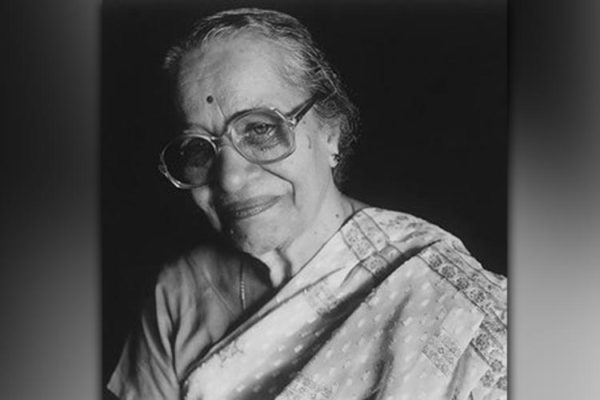Dr. Kamal Ranadive was an Indian biomedical researcher who contributed to cancer virology. She was one of the first researchers to link certain cancers to viruses. Her work helped make cancer therapy more effective and improve the quality of life for many cancer patients.
What is Dr. Kamal Ranadive’s story?
Born on November 8, 1917, in Tamil Nadu, India, Dr. Kamal Ranadive became interested in medical research early. After graduating from Madras Medical College with a medical degree, he worked as a doctor for two years before focusing on his research career.
In 1987, Dr. Ranadive co-founded the first National Cancer Research Center in India and has been its director since its inception. Under his leadership, the center has published more than 1,000 papers on cancer and continues to make significant contributions to cancer treatment and research.
His work has also made him one of the world’s leading biomedical researchers. Numerous prestigious organizations, including the Indian Academy of Sciences and the Royal Society of Medicine, have recognized him. In 2015, Dr. Ranadive was awarded the Nobel Prize in Physiology or Medicine for his work on cancer virology.”
As one of the world’s leading biomedical researchers, Dr. Kamal Ranadive has significantly contributed to understanding cancer and developing effective treatments. His work has led to advancements in cancer treatment and research domestically and internationally, earning him accolades such as the Nobel Prize in Physiology or Medicine.
What work did Dr. Ranadive do in cancer virology?
Dr. Kamal Ranadive is an Indian biomedical researcher who has significantly contributed to cancer virology. His work has focused on developing new approaches to treating cancer and understanding the genetic basis of the disease.
Ranadive was born in India in 1951. He received his medical degree from the University of Madras in 1974 and later completed his training at the London Hospital Medical School. He began his career as a medical doctor but soon realized he was passionate about research. In 1980, Ranadive moved to the United States to pursue a career in cancer research.
Her early work focused on understanding the role of viruses in cancer development. His efforts led him to develop novel approaches to treating cancer using viruses as delivery vehicles. Her most notable success was developing monoclonal antibodies (mAbs) targeting T-cell lymphoma virus (TCLV). These mAbs have been widely used to treat various forms of leukemia and lymphoma.
Ranadive’s work has also helped advance our understanding of the genetic basis of cancer disease. His team was instrumental in identifying several key genes associated with leukemia and lymphoma development. This knowledge is essential for designing targeted therapies that can optimize patient outcomes.
Ranadive is Genentech’s Chief Executive Officer (CEO) at one of the world’s largest biotechnology companies. He continues to contribute extensively to cancer research at Genentech and elsewhere worldwide…
How did Dr. Ranadive’s research impact cancer treatment?
Dr. Kamal Ranadive is a world-renowned biomedical researcher who has significantly contributed to cancer virology. His work has helped us better understand how cancer cells spread and grow and develop new ways to treat the disease.
Born in Uttar Pradesh, India, on November 8, 1917, Dr. Ranadive first studied medicine at university before focusing on research. He began his career at the Indian Institute of Medical Sciences (IIMS), where he worked on projects focused on HIV/AIDS and tuberculosis. In 1992, he moved to the University of California, San Francisco (UCSF), where he continued his work on these diseases and cancer.
While at UCSF, Dr. Ranadive conducted pioneering work on viral biology and tumorigenesis. He developed a method for studying gene expression in cancer cells under conditions that mimicked those found in the body (as opposed to using traditional cell culture methods). This technique allowed him to identify several critical tumor growth and progression genes.
In 2002, Dr. Ranadive left UCSF to become vice president of research and development at Genentech Inc., a pharmaceutical company based in South San Francisco County, CA. There he worked on projects focused on developing new medicines for various cancers. In 2005, he established Visant Health Inc., an autonomous Biomedical Research Foundation headquartered in Rockville Centre, NY, focusing on discovering new treatments for some of the world’s most deadly diseases.
Dr. Ranadive’s work has had a major impact on cancer treatment, helping us better understand how the disease develops and find new, more effective ways to treat it.
What are Dr. Ranadive’s current projects?
One of India’s most successful biomedical researchers, Kamal Ranadive, has made significant contributions to cancer virology. Recently, his team identified a new tumor suppressor gene that could help prevent cancer from developing. Ranadive is also working on a vaccine for HPV, a virus closely linked to cervical cancer. His work will surely improve the lives of many people worldwide.
Aside from his research, Ranadive also focuses on helping young people in India. He founded the Kamal and Bernadette Ranadive Foundation, which works to improve the lives of underprivileged children in the country. His work will make sure to impact many people’s lives positively.
For more interesting information visit our website




